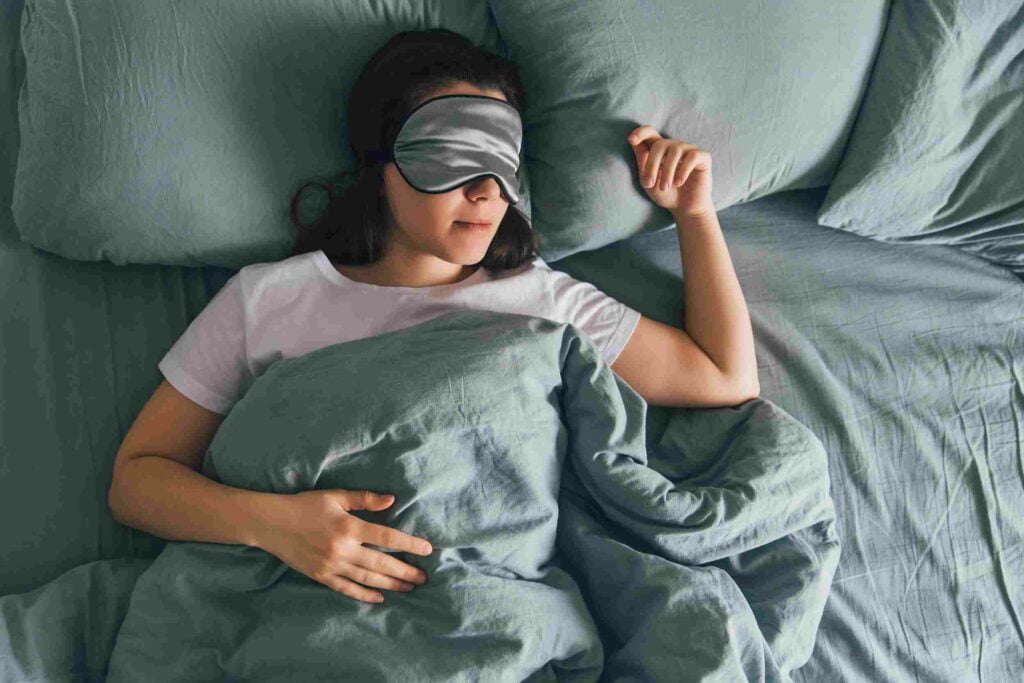Welcome to a guide that will change the way you experience those sleepless, sweaty nights. Night sweats and hot flashes can be more than just inconvenient; they can disrupt your sleep, leaving you exhausted and frustrated. Whether you’re experiencing these symptoms due to hormonal changes, stress, or other factors, finding effective remedies is crucial for reclaiming restful nights and revitalizing your well-being. In this blog, we’ll explore a variety of remedies for night sweats and hot flashes to help you cool down.
Contents
What Causes Night Sweats And Hot Flashes?
 Night sweats and hot flashes can be caused by various factors, and their occurrence is not limited to one specific condition. Understanding the underlying causes is crucial for effective management. Here are some common triggers:
Night sweats and hot flashes can be caused by various factors, and their occurrence is not limited to one specific condition. Understanding the underlying causes is crucial for effective management. Here are some common triggers:
- Hormonal Changes
The most common cause of hot flashes in women is menopause. During this natural biological process, there is a significant decline in estrogen levels, leading to hormonal fluctuations that can trigger hot flashes and night sweats. The transitional phase leading up to menopause, perimenopause, is characterized by hormonal fluctuations and can also contribute to these symptoms.
- Medications
Certain medications, such as hormone therapy, antidepressants, and some medications prescribed for conditions like diabetes, can cause night sweats and hot flashes as side effects.
- Infections and Illnesses
Infections, particularly tuberculosis and HIV/AIDS, can be associated with night sweats. Other illnesses, such as certain cancers (e.g., lymphoma), can also lead to these symptoms.
- Sleep Apnea
Sleep disorders like sleep apnea can cause night sweats. Interruptions in breathing during sleep can lead to increased stress on the body and trigger episodes of sweating.
- Thyroid Disorders
Hyperthyroidism, an overactive thyroid, can cause an increased metabolism and contribute to night sweats and hot flashes.
- Stress and Anxiety
Emotional stress and anxiety can lead to an increase in adrenaline, which, in turn, may cause a rise in body temperature, resulting in night sweats and hot flashes.
- Neurological Causes
Certain neurological conditions, such as autonomic dysreflexia or autonomic neuropathy, can disrupt the body’s ability to regulate temperature and lead to episodes of excessive sweating.
- Idiopathic Hyperhidrosis
In some cases, night sweats may occur without an identifiable cause, a condition known as idiopathic hyperhidrosis.
It’s important to note that individual experiences may vary, and the combination of factors contributing to night sweats and hot flashes can be unique to each person.
What Are Some Remedies For Night Sweats And Hot Flashes?
 Managing night sweats and hot flashes involves a combination of lifestyle changes, dietary adjustments, and, in some cases, medical interventions. Here are some remedies that may help alleviate these symptoms:
Managing night sweats and hot flashes involves a combination of lifestyle changes, dietary adjustments, and, in some cases, medical interventions. Here are some remedies that may help alleviate these symptoms:
Cooling Bedding and Sleepwear
Choosing the right bedding and sleepwear is crucial in managing night sweats and hot flashes. Opt for fabrics like cotton or moisture-wicking materials that allow better air circulation and draw moisture away from the body. This not only helps in regulating body temperature but also provides a more comfortable sleeping environment. Investing in specialized cooling pillows or mattress pads can further enhance your ability to maintain a cool and restful sleep.
Temperature Regulation in the Bedroom
Maintaining a cool bedroom is essential for minimizing the impact of night sweats. Adjust the thermostat to a comfortable temperature, typically on the cooler side. Consider using fans or air conditioning to circulate air and create a cooler atmosphere. Additionally, incorporating breathable window coverings can help control the amount of natural light and heat entering the room, contributing to a more conducive sleep environment.
Hydration
Adequate hydration is fundamental for overall health and can play a role in managing night sweats. Drinking cool or cold water helps regulate body temperature and can alleviate discomfort associated with excessive sweating. It’s important to stay hydrated throughout the day, and keeping a water bottle by your bedside can be a convenient reminder to drink water if you wake up experiencing night sweats.
Healthy Diet
A well-balanced diet contributes to overall health and can influence the frequency and intensity of night sweats and hot flashes. Focus on incorporating a variety of fruits, vegetables, and whole grains into your meals. Limit the consumption of spicy foods, caffeine, and alcohol, as these can act as triggers for night sweats. Opting for smaller, more frequent meals rather than large, heavy dinners may also help in preventing temperature fluctuations that can contribute to nighttime sweating.
Regular Exercise
Engaging in regular physical activity has numerous benefits, including the potential to reduce the frequency of night sweats and hot flashes. Exercise helps regulate hormones, improve circulation, and promote better overall sleep. Aim for at least 150 minutes of moderate-intensity exercise per week, such as brisk walking, swimming, or cycling. However, it’s advisable to avoid vigorous exercise close to bedtime, as this may have the opposite effect and increase body temperature, potentially triggering night sweats.
Stress Reduction Techniques
Stress can be a significant contributor to night sweats and hot flashes. Adopting stress reduction techniques can help manage these symptoms. Practices such as mindfulness meditation, deep breathing exercises, or yoga can promote relaxation and balance hormones. These techniques not only alleviate stress but also contribute to overall well-being, potentially reducing the frequency and intensity of night sweats and hot flashes.
Herbal Remedies
Some individuals explore herbal remedies as a natural approach to managing night sweats and hot flashes. Herbs like black cohosh and red clover are thought to have mild estrogenic effects, potentially providing relief from menopausal symptoms. However, it’s crucial to approach herbal remedies with caution and under the guidance of a healthcare professional, as they may interact with medications or have side effects. Additionally, the efficacy of herbal remedies can vary from person to person.
Acupuncture
Acupuncture, a traditional Chinese medicine practice, involves inserting thin needles into specific points on the body to restore balance. Some individuals report positive outcomes, including reduced frequency and intensity of hot flashes and night sweats, after acupuncture sessions. While the mechanism is not fully understood, acupuncture may influence the nervous system and hormone regulation. Consult with a qualified acupuncture practitioner to explore this option.
Limiting Evening Stimulants
Stimulants like caffeine and nicotine can disrupt sleep and contribute to night sweats. Limiting or avoiding these substances in the evening can promote better sleep hygiene and reduce the likelihood of nighttime disturbances. Opt for decaffeinated options in the hours leading up to bedtime and consider establishing a calming evening routine to signal to your body that it’s time to wind down.
Prescription Medications
In cases where symptoms are severe, healthcare professionals may recommend prescription medications. Hormone replacement therapy (HRT) is one option, particularly for menopausal women, as it addresses hormonal imbalances. Additionally, certain antidepressants (SSRIs and SNRIs) or medications like gabapentin may be prescribed to manage symptoms. These medications work by modulating neurotransmitters or affecting the central nervous system. It’s important to discuss potential risks and benefits with a healthcare provider.
Mind-Body Practices
 Exploring mind-body practices such as biofeedback or guided imagery can be beneficial. Biofeedback involves learning how to control physiological functions, such as heart rate and muscle tension, to reduce stress. Guided imagery uses mental visualization to promote relaxation. These practices can be integrated into a holistic approach to managing night sweats and hot flashes, addressing both the physical and psychological aspects of these symptoms.
Exploring mind-body practices such as biofeedback or guided imagery can be beneficial. Biofeedback involves learning how to control physiological functions, such as heart rate and muscle tension, to reduce stress. Guided imagery uses mental visualization to promote relaxation. These practices can be integrated into a holistic approach to managing night sweats and hot flashes, addressing both the physical and psychological aspects of these symptoms.
Remember, individual responses to remedies vary, and it’s crucial to consult with a healthcare professional before making significant changes to your routine or trying new treatments. They can provide personalized guidance based on your health history and specific symptoms.
How To Choose The Best Remedy For Night Sweats And Hot Flashes?
Choosing the best remedy for night sweats and hot flashes depends on various factors, including the underlying cause of the symptoms, individual health conditions, and personal preferences. Here’s a step-by-step guide to help you make an informed decision:
Identify the Underlying Cause
Begin by understanding the root cause of your night sweats and hot flashes. Hormonal changes, stress, medications, and medical conditions can all contribute. Consult with a healthcare professional to determine the specific factors influencing your symptoms.
Consult with a Healthcare Professional
Seek guidance from a healthcare provider who can assess your overall health, review your medical history, and conduct any necessary tests. They can help identify the most suitable remedies based on your circumstances.
Consider Lifestyle Modifications
Start with lifestyle changes that are generally beneficial for managing night sweats and hot flashes. This includes adjusting your sleep environment, choosing breathable bedding, staying hydrated, adopting stress reduction techniques, and incorporating regular exercise into your routine.
Explore Non-Pharmacological Approaches
Non-pharmacological remedies, such as herbal supplements, acupuncture, or mind-body practices, can be considered. However, it’s crucial to discuss these options with your healthcare provider to ensure they are safe and suitable for your specific situation.
Evaluate Dietary Changes
Assess your diet and make adjustments. Focus on a well-balanced diet rich in fruits, vegetables, and whole grains. Limit the intake of potential triggers such as spicy foods, caffeine, and alcohol. Some individuals find relief by including soy-based products in their diet.
Monitor and Track Symptoms
Keep a journal to track the frequency and intensity of your night sweats and hot flashes. Note any changes you make to your lifestyle or treatment plan. This information can be valuable during discussions with your healthcare provider and help in refining your approach over time.
Consider Individual Preferences
Take into account your preferences and comfort level with different remedies. Some individuals may prefer natural approaches, while others may be open to pharmacological interventions. Discuss your preferences with your healthcare provider to find a solution that aligns with your values and lifestyle.
Be Patient and Persistent
 Finding the most effective remedy may take time. Be patient and persistent in implementing the recommended changes. Regular communication with your healthcare provider will allow for ongoing adjustments to ensure the best possible management of your symptoms.
Finding the most effective remedy may take time. Be patient and persistent in implementing the recommended changes. Regular communication with your healthcare provider will allow for ongoing adjustments to ensure the best possible management of your symptoms.
Remember, there is no one-size-fits-all solution, and the effectiveness of remedies can vary from person to person. It’s essential to work collaboratively with a healthcare professional to tailor a treatment plan that addresses your specific needs and provides optimal relief from night sweats and hot flashes.
Conclusion
In conclusion, remedies for night sweats and hot flashes involve a personalized and holistic approach. Start by understanding the underlying causes through consultation with a healthcare professional. Lifestyle adjustments, such as creating a cool sleep environment, staying hydrated, and incorporating stress-reducing practices, can be effective initial steps. Explore non-pharmacological options like herbal remedies or acupuncture, and discuss prescription medications with your healthcare provider if needed.
Regular monitoring and open communication with your healthcare team are crucial for refining your treatment plan. Remember, finding the right remedy may take time. But with patience and persistence, you can reclaim restful nights and better overall well-being. If you are facing menopause related issues, menopause treatment at HerMantra can help. Book your free trial online menopause treatment session now.


